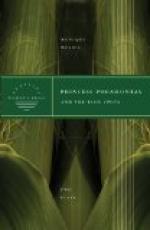She saw that the slaves had lost no time in obeying the command given them—they were dragging in the two great stones that had not been used for many moons. These were set in the open space before Powhatan and she knew exactly what was to follow.
Was there any possible way of escape? John Smith asked himself. If there had been but one loading in his pistol he would have fired at the werowance and trusted to the confusion to rush through the crowd and out of the lodge. But it was empty. No use struggling, he thought; he had seen men who met death thus discourteously and he was not minded to be one of them. So, when at a quick word from Powhatan two young braves seized him, he made no resistance. They threw him down on the ground, then lifted his head up on the stones, while another savage, a stone hatchet in his hand, strode forward and took his stand beside him.
“Well,” thought John Smith, “life is over; I have travelled many a mile to come to this end. What will befall Jamestown? At least I didn’t fail them. I’m glad of that now.”
He saw Powhatan lean forward and give a sign; then the red-painted face of his executioner leered at him and he watched the tomahawk descending and instinctively closed his eyes.
* * * * *
But it did not descend. After what seemed an hour of suspense he opened his eyes again to see why it delayed. The man who held it still poised in the air was gazing impatiently towards the werowance, at whose feet knelt the young girl Smith had noticed by the palisade. The child was pleading for his life, he could see that. Were these savages then acquainted with pity, and what cause had she to feel it for him?
But the werowance would not listen to her pleadings and ordered her angrily away. His voice was terrifying and the other squaws, fearing his rage might be vented on the child, tried to pull her up to the seat beside them. Powhatan nodded to the executioner to obey his command.
With a bound Pocahontas flung herself down across Smith’s body, got his head in her arms and laid down her own head against his. The tomahawk had stopped but a feather’s breadth from her black hair, so close that the Indian who held it could scarcely breathe for fear it might have injured the daughter of The Powhatan.
For a moment it seemed to all the anxious onlookers as if the werowance, furious at such disobedience, were about to order the blow to fall upon both heads. There was silence, and those at the back of the lodge crowded forward in order not to miss what was to come. Then Powhatan spoke:
“Rise, Matoaka! and dare not to interfere with my justice!”
“Nay, father,” cried Pocahontas, lifting her head while her arms still lay protectingly about Smith’s neck, “I claim this man from thee. Even as Wansutis did adopt Claw-of-the-Eagle, so will I adopt this paleface into our tribe.”




